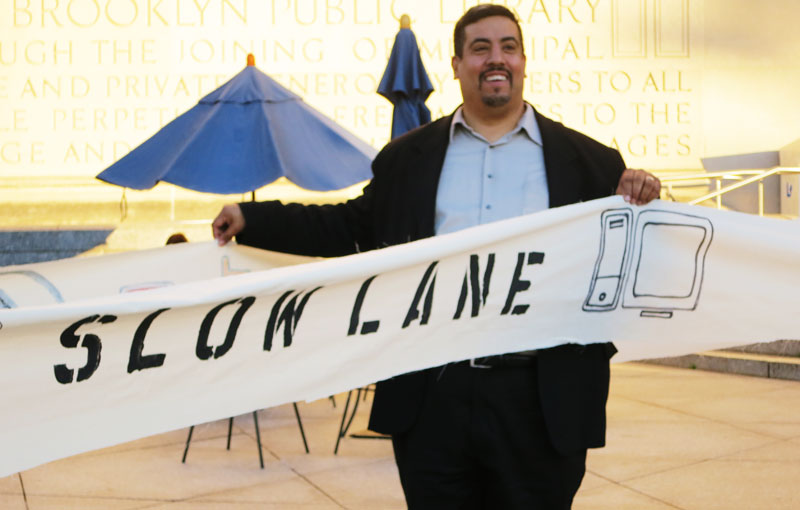In Net Neutrality Debate, New Yorkers Ask: Where is the FCC?
October 27, 2014
New York, NY – The nation’s most influential online and media activist organizations and leaders were in New York today to show their support for “one Internet for all,” and raise concern about potential FCC action that could allow fast lanes for the rich and slow lanes for America’s poor, rural and communities of color.

FCC chair Tom Wheeler’s current net neutrality proposal and a pending merger between Comcast and Time Warner will be decided in the next few months, and will have far reaching impacts for the future of the Internet. Yet FCC commissioners have not responded to calls for full hearings outside Washington D.C.. In fact, it has been more than five years since all FCC commissioners left Washington, D.C., in an official capacity, to hear how the agency’s policies affect the public.
In response, groups including Media Action Grassroots Network, Free Press, Consumers Union and Common Cause are holding a series of public hearings across the country starting with a Cultural Speak Out and Hearing attended by 200 people in New York on Monday night. The hearings are intended to deliver a message to the FCC: “We want One Internet. No blocking. No discrimination.”
Update: The New York hearing, at the Brooklyn Public Library, included a bit of political theater, with visual demonstration of fast and slow lanes for Internet content.
“Without Title II net neutrality rules that ban paid prioritization, discrimination and blocking on the mobile Internet, communities across the United States will be tracked into a digital ‘slow lanes’ and further excluded from the U.S. economy,” says Steven Renderos with the Media Action Grassroots Network, representing 175 social justice and media policy groups.
Title II reclassification, the groups argue, would provide the strongest and most sustainable protections for the Internet, allowing the FCC to use its authority to to ensure one fast lane for everyone. A majority of Latinos and African Americans use their cell phone for access to the Internet. The current rules proposed by the FCC would not protect these users.
“As the best-connected racial demographic in the U.S., Asian Americans have a major stake in net neutrality, and that includes mobile broadband,” said Cayden Mac, New Media Director with 18 Million Rising, a group that leverages technology and social media to engage Asian Americans, the fastest growing racial group in the United States. “We have long relied on the Internet to enrich our economic, civic, and family lives. Title II reclassification is in the best interests of our community, and for the preservation of key rights as emerging players in the American political landscape.”
Black and Brown Americans are leading the nation’s transition to mobile. 74% of African Americans use their cell phones for the Internet.
“The current fight for a free and open Internet is fundamentally about access and economics,” said Mariana Ruiz, Present.org, the nation’s largest driver of Latino action on the Internet.
“Without reclassification Latinos and other communities of color will carry the burden of paying more money for less Internet access, destroying the fundamental promise of the Internet – that it’s free from discrimination.”
“For an issue like determining how to protect the Open Internet, it is desperately important to hear from folks from outside of DC – especially because this issue, if not resolved correctly, could severely impact all of our day-to-day lives,” said Michael Scurato, Policy Director with National Hispanic Media Coalition, established in 1986 to promote diversity and better representations of Latinos in media.
Dennis Chin, who works for Center for Social Inclusion which uses data and stories to fight for broadband access in the Mississippi Delta, spoke of the need for more tools to fight for Internet Freedom. “Brooklyn-based Red Hook Initiative paved the way to keep their community online, connected and communicating during and after Hurricane Sandy,” said Chin. “They were vital to coordinating aid in the aftermath of the storm. They are able to provide their neighborhood with a wireless mesh network partly because they partner with a small, independent internet service provider called Brooklyn Fiber.”
Dallas Donnell is Communications Manager with Color of Change, an online organization formed by a single email in the aftermath of Katrina, and now has 900,000 members. “Historic disenfranchisement of Black communities makes Net Neutrality protections and community solutions critical to telling our history, and crucial to our future,” shared Donnell to the crowd. “It’s hard to imagine we’d be able to do this if we had a tiered Internet system, controlled by a corporate bottom line. That’s why we need real – not artificial – net neutrality. And real net neutrality looks like Title II.”
-###-



